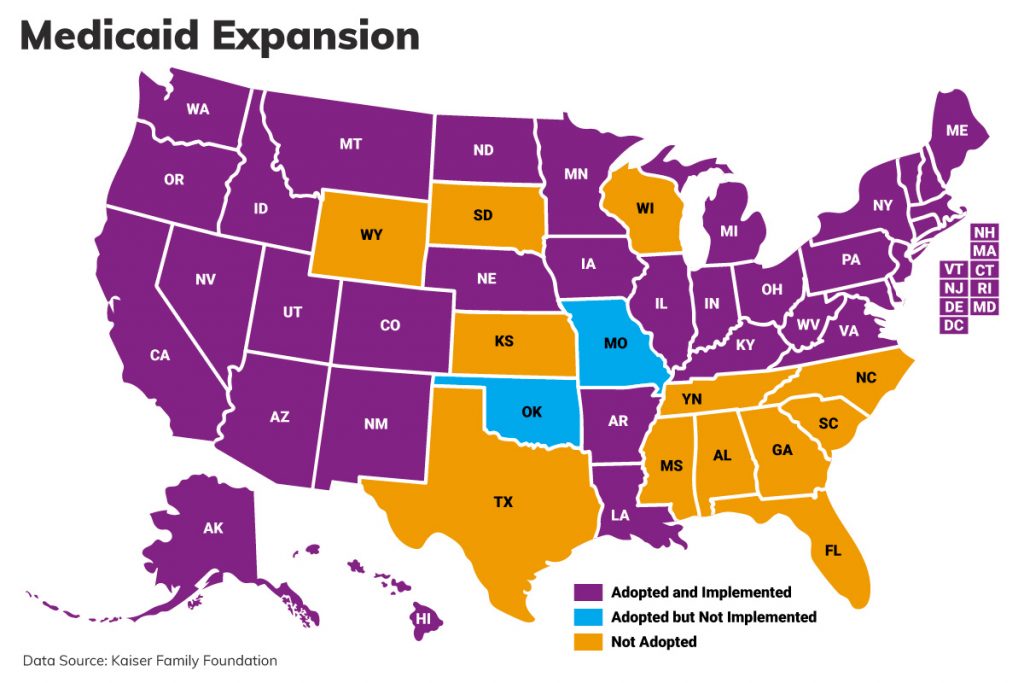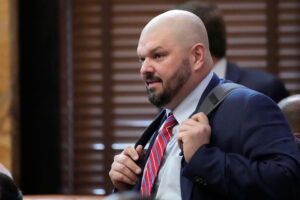For Mississippi Hospital Association President and CEO Tim Moore, the 2021 Mississippi Legislative session was a breaking point.
“I’ll be honest with you,” he told the Mississippi Free Press in a Tuesday interview, “I felt deep in my heart that with the peak of the pandemic, and us getting all these (federal) subsidies, that the legislators would step up and pass some version of Medicaid expansion. But that didn’t happen.”
The Mississippi Legislature’s latest refusal to expand Medicaid access forced a decision that had long been brewing in the minds of public-health leadership across the state: to bypass the gridlocked Legislature entirely and put Medicaid expansion on a ballot initiative directly to the people.
Moore, alongside public-health expert Dr. Nakeitra Burse and Hattiesburg pediatrician Dr. John Gaudet, last week incorporated “Healthcare for Mississippi,” an advocacy nonprofit intended to shepherd the new initiative through the signature gathering process in time for 2022’s national midterm elections.
“After 10 years of giving the Legislature an opportunity to take action and to represent this portion of the population that can’t get coverage,” Moore said, “to represent our hospitals that have been here for over a year now, serving their friends, family, neighbors, whoever comes through the door . . . you have to take the next step.”
For Moore and the others backing the initiative, it is an urgent idea. “We’ve got to let the people decide. If our representation in Jackson won’t make a decision, then the people have to choose,” he said.
Prior Ballot Initiatives ‘Not Discouraging’
The ambitious plan for enshrining Medicaid expansion in the state’s constitution, first reported by Geoff Pender at Mississippi Today, follows a post-pandemic session so openly hostile to the concept of expansion that even a Republican-supported measure for temporary postpartum Medicaid coverage died on the negotiating table.
The news of the upcoming initiative drive also builds on last year’s momentum, where a statewide measure put the capstone on the Legislature’s successful effort to change the state flag. Another one, Initiative 65, resoundingly succeeded, writing a medical-marijuana program into the state’s constitution purely through popular will.
Moore was firm that his decision to back a ballot initiative emerged from frustration over years of gridlock, not recent successes of public ballot measures. But he did appreciate the powerful precedent set in 2020. “That did not discourage us,” he explained, “but there’s been this discussion for a number of years.”
The MHA president said he was hesitant to pursue this particular avenue of Medicaid reform in the state. But this session convinced him that not even substantive discussion of Medicaid expansion had a chance of survival in the Legislature.
“Philosophically, I don’t believe that medical marijuana, or health-care issues should be a part of the constitution. I think that should have been legislated on. … That’s why we sent people to the Legislature, to representatives: to make decisions and move us in the right direction. But when they don’t make choices and won’t decide on a controversial issue, then you have to do it a different way.”
‘Skin in the Game’
Medicaid is a federal program to provide health-care coverage to needy, underserved and vulnerable populations without the cost of traditional health insurance. In 2010, the Affordable Care Act established new qualification standards for Medicaid, expanding access to the program to all Americans at or below 138% of the federal poverty level—under $18,000 for a single adult and just over $36,500 for a family of four.
The Medicaid program is managed at the state level, but the ACA mandated that states accept the expansion to receive any funds for the program at all. Then, a 2012 U.S. Supreme Court decision struck down the mandate, leaving the final decision on expanding Medicaid to individual states, a decision that, as of 2021, only Mississippi and 11 other states have failed to expand Medicaid.

Top State of Mississippi leadership varies on their approach to Medicaid, tied up as it is in conservative consternation over the ACA—or as they tend to call it, Obamacare. Gov. Tate Reeves’ opposition to Medicaid is practically a mantra, a steady pledge to reject the program’s expansion that predates his governorship.
“My position has not changed,” Reeves repeated at a mid-March press event. “I am opposed to expanding Medicaid in Mississippi … I am opposed to Obamacare expansion.”
House Speaker Philip Gunn, R-Clinton, is almost as vocally opposed to expansion. “I don’t see it as something we can afford, I don’t see it as something that’s beneficial,” he told the press at this session’s close.
Lt. Gov. Delbert Hosemann is seen as the softest touch on the issue. He has repeatedly indicated openness to the prospect of Medicaid expansion, though vituperative opposition on his party’s right flank has made open pursuit of those goals a non-starter.
In a 2019 press briefing, Hosemann said he was weighing contributory requirements on Medicaid expansion. “If you’re not working a job or seeking a job, you’re not getting covered. (We can) narrow this down to individuals who have some skin in the game,” Hosemann said then.
Even if the State expanded Medicaid on this stricter basis, as Hosemann suggested, Moore explained that well over 100,000 of the state’s residents would receive Medicaid: Mississippians already in the workforce whose wages place them below the federal poverty level that would qualify them for expanded Medicaid.
“We have tried to be conservative and middle of the road (in our estimates). And we have said somewhere around 200,000 Mississippians will fall into this group. And two-thirds of those already work,” Moore said.
$250 Million in Savings
Republican concerns over costs and benefits for the program’s expansion are often at odds with the facts of Mississippi’s health-care system.
The federal government pays for the majority of Medicaid expansion nationwide. Even more of that cost is covered in the case of a comparatively poor state like Mississippi. President Joe Biden’s American Rescue Plan Act increases the compensation for Mississippi’s Medicaid matching up to 90%.
Sen. Hob Bryan, D-Amory, summed up the money left on the table to Mississippi Today reporter Bobby Harrison in early March. “For a number of years, the federal government has been offering us $1 million a day to take care of sick people. Now they are offering $1 million a day to take that other $1 million a day. You can’t make this stuff up,” Bryan lamented.
Mississippi taxpayers already provide the federal dollars that support the Medicaid program. The benefits of expansion would extend to many in the state’s medical professions, as well as individuals and families.
“If you look at the economic-impact study that was done by the Perryman Group out of Texas—an independent study they actually did for the Republicans—came back showing that it would be worth $200 million a year,” Moore said.
The issue in question is uncompensated care. The MHA estimates that Mississippi hospitals lose $600 million each year for services with no payment forthcoming from either insurer or patient.

Medicaid expansion, the Perryman Group study concluded, could save the state’s hospitals more than $251 million of the uncollected fees. That new source of revenue could be a significant boost to the state’s ailing rural hospitals, dozens of which are constantly on the brink of closure, in part due to high levels of uncompensated care.
Not only did the Legislature kill any legislation to fully expand Medicaid, but even piecemeal measures with broad support met an untimely end. That included the postpartum expansion, which would have provided Medicaid coverage for Mississippi’s new mothers for a year after the birth of their children.
Formal Medicaid expansion was frequently triple-referred, crammed into committees with no hope of being called up, much less debated and passed. Moore asserted that popular support for Medicaid expansion far outweighed Legislative appetites for growing the program.
“We feel very confident that when everyone understands all that’s involved in (providing health care) to this population, they’ll support it,” he said.
‘It’ll Take A Generation To Fix It’
The new nonprofit supporting the Medicaid ballot initiative is in the earliest stages of seeking the 106,000 signatures they’ll need for the issue to come before voters next year. Other public-health leaders are approaching the move with caution, waiting for their institutions to provide formal support through policy drafts and position votes.
Dr. Jennifer Bryan, chairwoman of the board of the Mississippi State Medical Association, offered only positive neutrality to the measure in its early stages. MSMA is expected to take a formal issue on the matter later in the year.
“The Mississippi State Medical Association is supportive of increasing access to medical care via health insurance,” Bryan said in an interview with the Mississippi Free Press, adding that “our board is studying the current possibilities for that to occur.”
Moore is fine with playing the long game. He sees the task of improving health outcomes in Mississippi as both an acute and a generational challenge.
“We can’t look at it as just today. Because you can’t just fix it today. It’ll take a generation or two to fix it, but you’ve got to start right now. You gotta start somewhere—start being proactive on healthcare instead of reactive. We can’t be shortsighted. This is for decades down the road,” Moore said.










